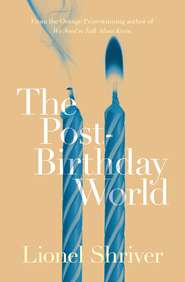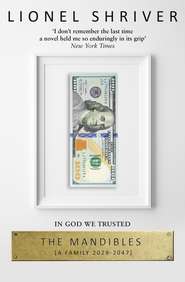По всем вопросам обращайтесь на: info@litportal.ru
(©) 2003-2024.
✖
The New Republic
Автор
Год написания книги
2018
Настройки чтения
Размер шрифта
Высота строк
Поля
To Edgar’s undying relief the gamble had paid off in spades, but the odds had been a hundred-to-one that Falconer would put in a good word for him. Most hacks would see Edgar as a wet-nosed neophyte, his designs on their vocation impertinent. The uncanny cordiality should have been a red flag: this was not the Toby Falconer of yore.
“Didn’t beat around the bush, either,” Falconer recalled wryly. “No small-talk.”
Edgar squirmed. “I hate that how’re-the-kids shit. No offense, but why should I care if your youngest is in the choir? You’d figure out that I was hitting you up for a contact soon enough.”
“Since Yardley, I haven’t even been on your Christmas card list. Weren’t you worried I’d brush you off?”
“Worried? I expected it. But I figured, what’s to lose? A little pride. Maybe when I was still raking in the bucks at Lee & Thole, losing face would have seemed like a big deal. In my newly influential career as a commentator on world affairs, I’ve sold my car, let my health-club membership lapse, and forgone the firm’s box at Yankee Stadium. What’s next? Among a host of other luxuries, dignity is expendable.”
Falconer shot a wry glance at Edgar’s wrist. “I see you’ll sell off your dignity before you’ll pawn your watch.”
Parting with the $1,500 diving watch would have amounted to the ultimate admission of defeat. “A present for passing the bar, from my mother. Call me a sap.”
“Sentimentality from you, Kellogg, is a relief.”
Pushing himself, Edgar opened his mouth, and it gaped before the words came out—if strangely difficult to say, wildly important, and he was mortified that he’d almost skipped them altogether: “Anyway, um. Thanks. Thanks a lot.”
“I’d never have given you the thumbs-up with Wallasek if I didn’t expect you were capable,” Falconer said good-naturedly. “The one thing I never doubted at Yardley was that you were smart, even if I wasn’t always too thrilled about what you applied your intelligence to—like, to locating people’s weak spots. Besides, I admit I had an agenda. I’ve got some rusty curiosity to satisfy. If I snagged you an interview with my editor, even the surly Edgar Kellogg might feel beholden enough to have this drink.”
Edgar sat up in surprise. “I wasn’t sure you’d remember me.”
“How could I forget? Some of the things you said about me senior year. They got back. Maybe they were meant to.”
Edgar had contempt for New Age confessionalism, and wasn’t going to enjoy this. He shrugged. “Kids can be mean.”
“You’re not a kid. You’re still—”
“You think I’m mean? That’s rich.”
They looked at one another squarely for a beat. “I don’t get it,” said Falconer.
“How do you think I was treated, as a two-hundred-forty-pound punching bag?”
“You ever going to let that go? I thought junior year at least we treated you all right.”
“Like with Wallasek. I’m supposed to be grateful.”
Falconer threw up his hands. “It’s just—what happened? One minute you were hanging out with us twenty-four-seven, and the next, bang, opposite side of the dining room. You passed me in the hall like a parking sign. And then all this stuff starts filtering back, that I’m on a ‘power-trip,’ that I’m a fag, that I get other guys to write my papers—”
“You did—”
“We all did! And that I dyed my hair.”
“I never said that.”
“You might as well have! What got into you?”
“I liked you,” Edgar said with difficulty. “I was disappointed.”
“I don’t—”
“I overheard you, okay?” Edgar’s raised voice carried over the dead bar and drew a glance from the sniffling Miss Loneliheart, who looked relieved that other people had troubles, too. “I overheard you,” he continued quietly. “In the locker room, you and that crowd, you didn’t realize I was in the shower. I turned off the water and stayed behind the wall. I hadn’t been aware that my nickname was ‘Special K’—”
“Come on, we were always razzing somebody—”
“This was different! You mimicked me, like, ‘Oh, no, I can’t have that chocolate chip, it has a whole eleven calories! A moment on the lips, a lifetime on the hips!’” Edgar twisted in his seat. “And you made fun of my stretch marks.”
“Edgar, if anything, a little teasing only meant you were included. It was the zeros we didn’t talk about you should have felt sorry for.”
Edgar looked up sharply; this was the Toby Falconer he remembered. “It got worse. You said I was always hanging around you with goo-goo eyes. That it was like having some girl on your hands, or a lost puppy. That every time you turned around I was yapping at your heels—wanting to know where you were going so I could go, too, or what club you were joining so I could join, too, and what albums you liked so I could go out and buy them. You all cackled at how I’d started wearing a red baseball jacket just like yours, and how I’d applied to switch into your English section. Clingy. You used the word clingy. So I let go.”
Thumbs pressed into his temples, Falconer kneaded his forehead with his fingertips, eyes closed. “God, Kellogg, I’m so sorry. I promise, it wasn’t you, or only you. It was all of them. I was tired. I was only seventeen years old, and I was already tired.”
Having held in that story for two decades like a breath, now that he’d exhaled it Edgar relaxed, looking on his companion with uncharacteristic tenderness. “Hey, water under the bridge. Anyway, you’ve changed. I mean, you’ve grown up and all, and you seem a lot more—forgiving.” Edgar thought that was a nicer way of putting the fact that Falconer had no edge anymore and had turned into a soft touch for the likes of Wallasek. “But there’s something else. Something, I don’t know—missing.”
Falconer didn’t take offense, but smiled wanly and smoothed his palms down his face to rest them flat on the table. “You mean I’m not surrounded by adoring fans? I’m not tap-dancing on the ceiling with a hat rack?”
Edgar tore a wet shred slowly off his Amstel label. “Whatever.”
“Senior year—you heard my father died?”
“Secondhand.”
“You weren’t speaking to me at the time. Anyway, it hit me hard. All the gang were consoling, for about five minutes. Maybe that made me lucky. Maybe less, well, less prominent kids whose parents died got consoled for only two or three minutes. But after my five minutes were over I was supposed to go back to thinking up pranks to play on our Spanish teacher, leading sneaks off campus after curfew, and inventing new ways to propel our pineapple upside-down cake at lunch. I couldn’t do it. I had more ‘friends’ than anyone at Yardley and I was so lonely I could scream. They all wanted their emcee back, but meanwhile, who was going to lighten things up for me?
“So my mom was a mess without my dad, and I felt bad for being away at school. My sister had started sleeping around at the age of twelve. You were spreading rumors that I led circle-jerks, and I was badgered by volunteers who wanted to join in. I was depressed and couldn’t concentrate on exams. All I got from my buddies was snap out of it. I was sick of the phone ringing in my hall and it was always for me. I was sick of people whispering and all their little theories about what made me tick. I was sick of brown-nosers who liked me a lot more than I liked them.
“This is going to sound a little out there, so cut me some slack. That ‘something missing’ you mentioned: it was all that crew wanted and it had nothing to do with me. It was some weird power that wasn’t to my credit because I didn’t invent it, and it was totally beyond my comprehension. I had no idea why if I said jump in the lake, you guys would jump in the lake. If you told me to jump, I wouldn’t do it. And I looked at myself, I saw a regular high school senior with problems, and you people saw, what—truth is, I have no idea what you saw. This gift, it was like a magic lantern. But it was also a curse.
“So I tossed it. I didn’t apply to Yale or Harvard, but Haverford. And at college I wore pastel button-downs and plain slacks. I didn’t talk in class and I didn’t go to keg parties. I stayed in my dorm room and studied. I was a bore and nobody ever talked about me behind my back any more than they’d mention the wallpaper.”
“And then you lost your hair.” Edgar was being undiplomatic again, but he almost wondered if Toby’s metallic locks had been yanked as punishment. The notion of willingly giving up whatever it was that Falconer had in high school was reprehensible.
“Like Samson.” Toby grinned. “I wonder if it’s just as well. Maybe it all came down to my hair to begin with, huh? My sister has the same coloring, and I swear that half her admirers only wanted to sink their fingers into that waist-long corn silk. Deborah got so pissed off with one guy that she cut it off and gave it to him in a box.”
“It wasn’t the hair.”
“I don’t even care. Whatever you guys were so hot for, I couldn’t see it myself. I’m sorry I called you ‘clingy.’ I don’t remember saying it, but I’m not surprised I did. Honestly, Kellogg, you did get to be a pain. You were always dogging me, but never wanted to really talk. That part of you that I was drawn to, that lost a hundred pounds in six months? That part never seemed to speak up. And on the one hand you acted so hard-ass, but on the other, you, I don’t know, seemed to idolize me or something. Made me feel creepy, like a fake. I’d no idea what you saw in me, what about me was so great.”
“I guess I did try to impress you,” Edgar admitted. “Maybe I tried too hard. But you had such style, Falconer.” Edgar couldn’t help the past tense. “It’s rare.”
“I may be kidding myself that I gave it up,” Toby mused. “It could have just got away from me.”
“I’ve watched out for your byline for years: from Belfast, Somalia, the Gulf War. I always pictured your life as exotic, edgy. One reason I quit law. Thought I’d join you.”
The confidence got out before Edgar realized that it sounded like more of the same: searching a dozen vintage clothing shops for a fifties baseball jacket, and the one that fit the best and had the coolest logo on the back just happened to be the same cardinal-red as Toby Falconer’s. Edgar’s biggest concern about his own character was that he wasn’t original. He didn’t know how to become original except by imitating other people who were.
“I do my job, and pretty well,” said Falconer. “It’s more ordinary than it seems, though. Like you said, to do with sentences—plodding, workaday. I am, anyway. I’m quiet. I’ve got to the point I don’t much like being on the road, and I’ve encouraged Guy to give the firefighting assignments to younger reporters who’re still hot to trot. I like going home to Linda, sourdough pretzels, and the Mets on TV. You put your finger on it: I’m sincere. I don’t have a lot of friends, but they’re real.”











